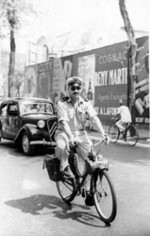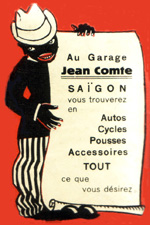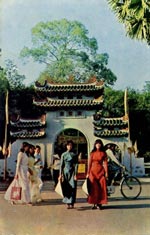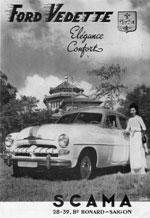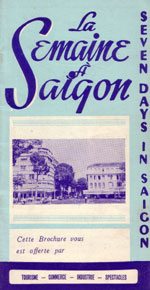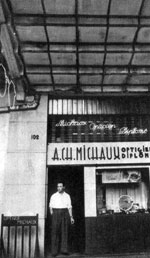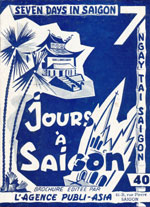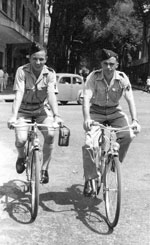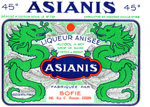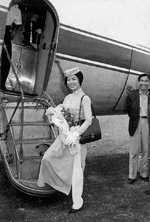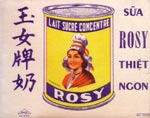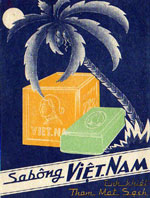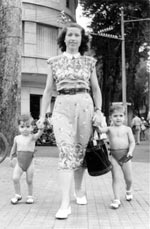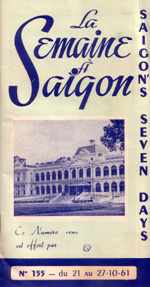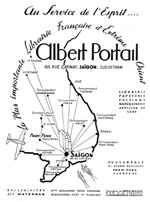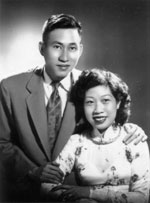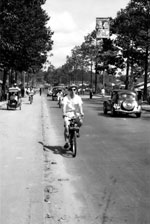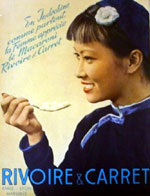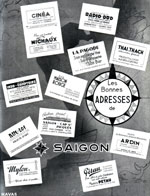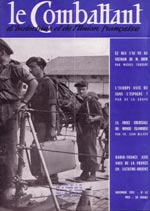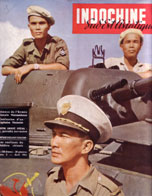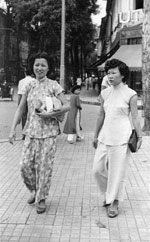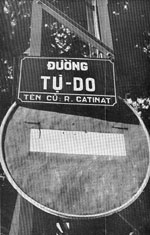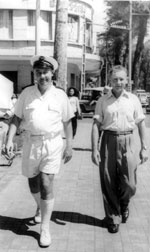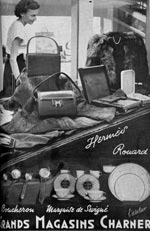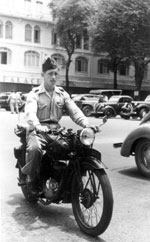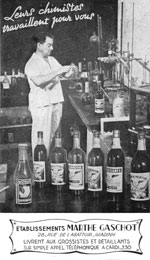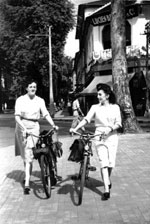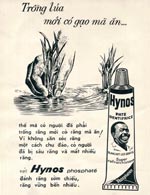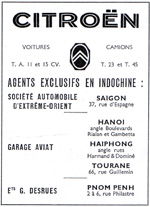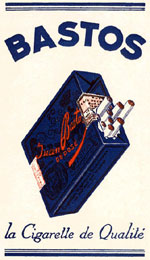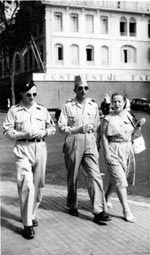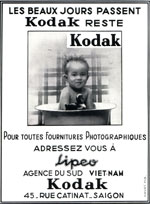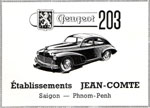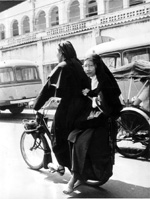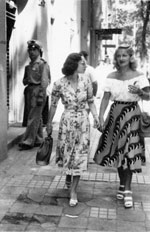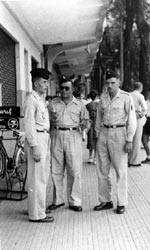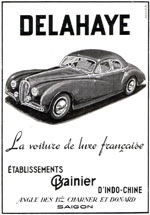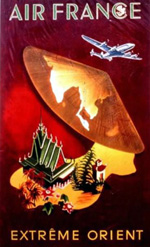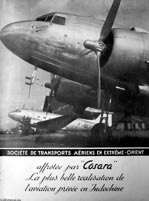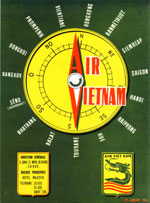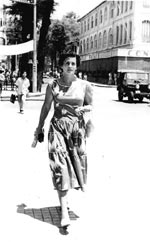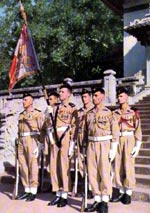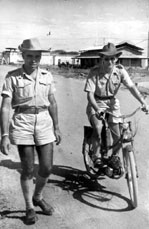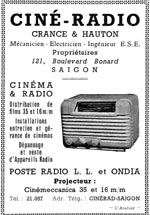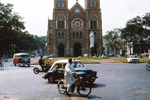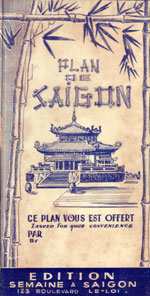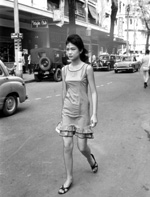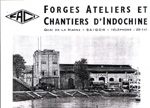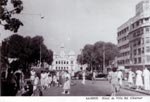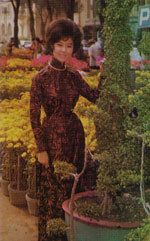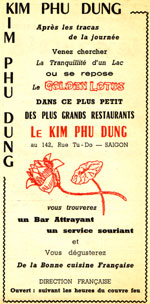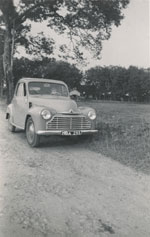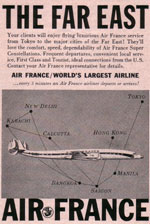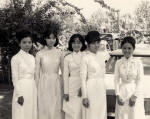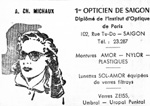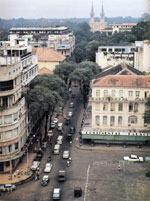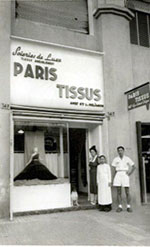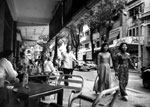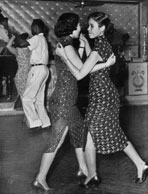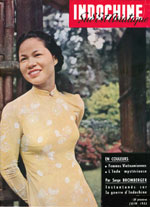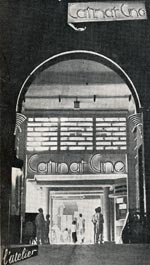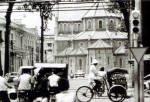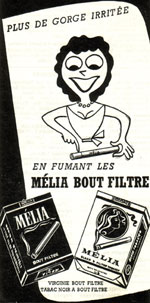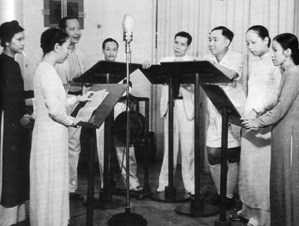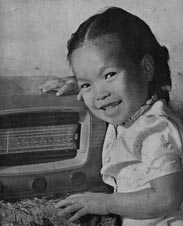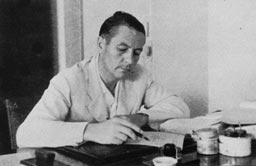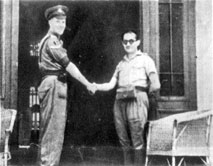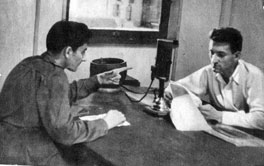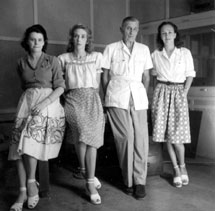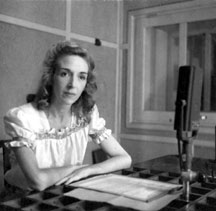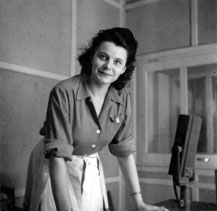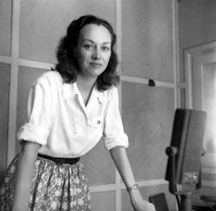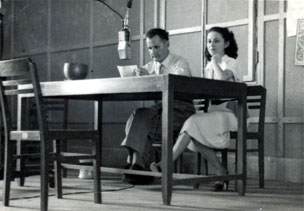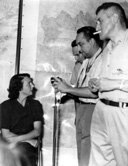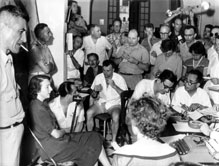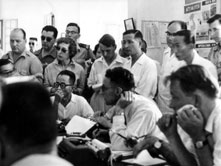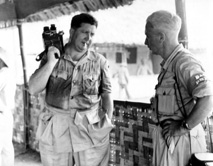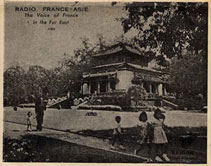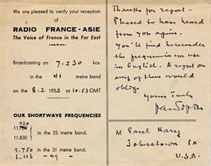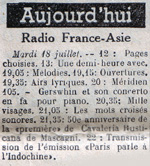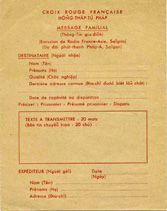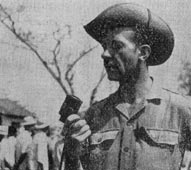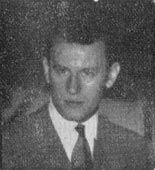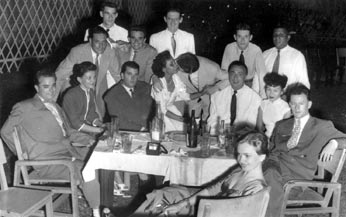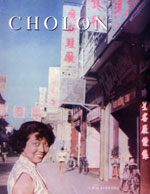
Radio Saigon from 1939 to 1945
Radio Saigon broadcast in seven languages during the Second World War; it was the âVoice of Franceâ in the Far-East under the direction of Jacques LeBourgeois.
Jacques LeBourgeois
Jacques LeBourgeois in his Saigon's office in 1944.
Radio Saigon fell silent on 9 March 1945, having been overrun by the Japanese.
It spent the following few weeks under the control of the Annamites and the personnel of Radio Saigon remained under guard by Vietminh troops.
In the following weeks, Colonel CĂ©dile, administrator of Africa and promoted to Commissioner of the Republic in Indochina, would take over Radio Saigon.
In 1949 the Franco-Vietnamese accords gave Vietnam broadcast facilities created by France which gave birth to âVietnam Broadcastingâ, an entity completely different from âRadio France-Asiaâ.

Radio Saigon from 1945 to 1949
Radio Saigon would again transmit under French control as of December 1945 until the accords between France and Vietnam in 1949..

Radio 1946
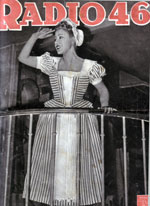
An article published in âRadio 46â, No. 70, Friday, February 22nd, 1946.
Radio Saigon, the voice of France in the Pacific.
Special envoy to the Far-East, Jacques Sallebert, was a war correspondent for Combat, Le Monde, and Le Figaro, covering conflicts in Israel, Indonesia, China, and Korea. He would become one of the great personalities in French television from 1948 to 1982.
"Before the war, Saigon had one of the most powerful transmitters in the Pacific and the voice of France was heard in all of the Far-East".
By an extraordinary bit of luck that bordered on a miracle, the antennas and the studios of Radio Saigon were not damaged in the war. The Japanese occupation and the Viet-Minh takeover spared this magnificent means of broadcast which allowed our culture to prevail in this region of the world.
Unfortunately, although the main part of the complex was saved, the equipment is very tired and doesnât allow the same transmitting power as before the war.
Unfortunately, although the main part of the complex was saved, the equipment is very tired and doesnât allow the same transmitting power as before the war. Big plans have been laid out, which would make Radio Saigon in Asia what Radio Brazzaville is in Africa. It is necessary, at a time when the big allied powers are making an intense effort at propaganda in the Pacific, for the voice of France to be heard on a par with those of America, England, China, and Russia. Letâs hope weâll be able to take advantage of the good fortune we had in finding an installation in good condition that would have been impossible to rebuild in the present day.
The role of radio in Indochina is now considerable. After their power grab in March of 1945, the Japanese requisitioned all the transmitters belonging to the French. This equipment were piled up in warehouses and resold to the Annamites by Japanese propaganda, which resulted in a situation where the French had no receivers, and the Annamites never had more of them in their possession.
Radio and parachute drops of leaflets are the only direct means we have of opposing all the propaganda from different sources currently being deployed in Indochina.
Before long, we will have a mobile recording studio-bus in Indochina which is coming straight from Paris. This unitâs mission will be considerable and radio reporting will take on an importance it has rarely had since the invention of radio. Radio Saigon will be for Indochina what the B.B.C. was for France during the occupation.
On the left: An English soldier and a French soldier guard the entrance to the Radio Saigon building.
On the right: Lieutenant Petit, a military commentator, and GĂ©rard Valentin, the manager of Radio Saigon â the voice of France in the far-East.

On April 13th, 1950, Radio Saigon became Radio France-Asie
Left: Station chief of âParis Saigonâ in 1950, Mr. Jean-Marius Pipon, with his three announcers, left to right: Suzanne Harsillard, Margaret Legrand, and Eileen Griffin.
Jean-Marius Pipon was born on March 16, 1887 in Lyon and died on December 12, 1960 in Laroque-des-AlbĂšres (Pyrennees Orientales)
Right: Margaret Legrand who was an announcer for Radio-Saigon and later for Radio France-Asie at the microphone.
Left: Suzanne Harsillard at the Radio France-Asie mic in October of 1950 for the English-language broadcast.
Right: Eileen Griffin in the double mic studio of Radio France-Asie in October of 1950 for the English-language broadcast.
A protected domain: English-language programs.
From 1943 until 1954 programs in English were directed by Jean-Marie Pipon.
"When the Japanese were occupying Indochina territory, not only did Radio Saigon continue to broadcast in English, but additionally, English-language broadcasts were not at all censored, whereas the French ones wereâŠ
I was at Radio Saigon on March 9th, 1945, at the moment of the coup. The Japanese invaded our studios and kept me in my officeâŠ
It wasnât until September 26th, 1945 that I was able to get before the microphone again".
Eight daily programs in English
From 1948 on, the « spoken journal » of Saigon was broadcast eight times a day:
- 0755h, 0855h, 1955h: five minutes of local news.
- 0715h, 0815h, 1230h, 2000h: a quarter-hour of French and international news.
- 2155h: last news of the day..
Five anchor women, mostly English, and an artistic program director put these shows on..
Mister Hoang-Cao-Tang, Head of Vietnamese programming
Vietnamese programming for Radio France Asia was directed by Hoang-Cao-Tang, who already performed the same function at Radio Saigon from 1939 to 1943. The list of his main collaborators: Rober Grangier, a Eurasian from North-Vietnam, MĂąn, a North-Vietnamese, and Phai, a South-Vietnamese, all three journalist-presenters. Jean Tinh, director-presenter, is the most senior member of the Radio Saigon team".
"I also have two female presenters, one from the North, Madame Toan, and the other from the South who is none other than my companion Madame Tang. Besides all those people, about fifty Vietnamese performers add to our daily renovated music programming and Cai Luong, etcâŠ"
Every day the service broadcasts six news programs, three in Cochin-Chinese, three in Tonkinese, as well as a lengthy artistic program in the early evening.
Radio-Saigon Broadcasts three times a day in Chinese: 0745h, 1100h, and 1615h. The daily programs are made up mostly of news in Mandarin and in Cantonese or ChiĂȘu-Chau.
Most of the scripts are written by Chinese professors from Saigon and Cholon. The Chinese programs are directed by ViĂȘn-Phuoc, former professor of moral sciences at the Sun-Yat-Sen University in Cholon; Hoang-Minh-Tac is ViĂȘn-Phuocâs assistant. He has worked at Radio Saigon since 1939.
Chinese programming is directed by China specialist Jean-Michel Kermadec.
Minutes before the show in 1952
Minutes before the show on radio France-Asie in 1952.

Radio France-Asia from 1949 to 1956
Trung Gia (40 km North of Hanoi) Juiy 4th 1954 :
Press Conference at the microphone of Radio France-Asia on prisoner exchanges between the French Army and the Viet Minh after the Geneva Accords in 1954.
(on photos GeneviĂšve de Galard's liberation)
On the right: Trung Gia, July 4th, 1954; French photojournalist Lucien Millet in conversation with a Russian colleague, Roman Karmen, a noted cinematographer, documentarian and propagandist of the Soviet Union.
Radio France-Asia, voice of France in Southeast Asia and the Far-East, depends directly on French Radio & Television (RTF). Its material is provided by the "France-Presse", "Reuters", "United Press", "Kyodo", and "Aneta" agencies, and it receives variety programs from Paris. It broadcasts in French (44%), Vietnamese (17%), Chinese (15%), and English (10%)..
Radio France-Asia provides recorded music and French variety programs presented in French, English, or Mandarin Chinese to Jakarta (Indonesia), Hong Kong, Manila, New Delhi, Rangoon, and Singapore. These services extend to Ceylan (now Sri Lanka) and Pakistan.
Radio France-Asie
Headquarters and studios:
86 Maréchal de Lattre de Tassigny Street (now Nam Ky khoi nghia)
Saigon
tel : 20.080 and 20.081
Chinese Broadcating
13 - A, Taberd Street
Saigon
tel : CA.729
Radio France-Asia
Chritmas 1954
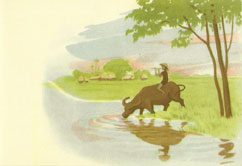
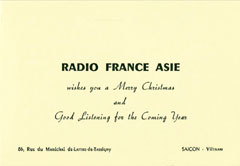
Radio France-Asie wishes a Merry Chritmas and good listening for the Coming Year.

The Voice of France in the Far East

Program july 18 1950
René Hervé (real name René Pithon), started out in radio with the army's Social Services and was involved with broadcasts aimed at "upholding the morale of the troops" on Radio-France-Asia in Saigon. He would go on to work for other outlying radio stations (Radio Monte-Carlo, Radio Luxemburg, Radio Andorra).
Joseph Crampes, who eventually became Jacques Chancel, war correspondent in Indochina in 1950 at the age of 22, would also become a radio host on Radio-France-Asia in Saigon, would be tasked with personal dedications for soldiers deployed to Indochina. In 1958 he created Radioscopie and over a period of 20 years hosted 6,800 shows on France-Inter.

Le Combattant Magazine
Radio-France-Asia
Left: âFamily Messageâ to prisoners by way of the French Red Cross, following an announcement broadcast on Radio France-Asia.
Right : A monthly magazine published by the former members of C.E.F.E.O. (Corps ExpĂ©ditionnaire Français en ExtrĂȘme-Orient) [French Expeditionary Corps in the Far-East], and of the French Forces in Indochina. National President: Roger Delpey.
National President: Roger Delpey
Secretary-General: Yves Gignac
45, rue de Naples
Paris VIII

This Radio-France-Asie in 1955
The voice of France in the Far-East
A red signal lights up: « Silence ». Behind the glass, the director raises his hand and lets it fall back in the direction of the speaker. At 86, rue du Maréchal de Lattre de Tassigny, in the former studios of "Radio Saigon", the day starts at 0700h. Saigon is still somewhat asleep.
Three minor tones break the silence. A voice announces: âThis is Radio France-Asiaâ. This voice is repeated by thousands of radio sets, and is heard by thousands of French and Vietnamese listeners.
Thanks to him, the company is successful despite difficulties of all kinds under the pseudonym of Jean Martial. Jean Varnoux broadcasts editorials which are âcurrentâ, which is how he recently responded to those among the South Vietnamese newspapers which attacked Radio France-Asia⊠under the pretext that it debauched young people by exposing them to rotten literature and decadent music. A tough answer, but how right and courteous! This only added to the gulf separating the attackers and the defenders .
The editor in chief is Monsieur René Branellec. His articles are well listened-to. Impartiality, his main quality, makes him a journalist appreciated by both sides. The Radio France-Asia reporters have followed a large number of operations conducted by the Expeditionary Corps, and one can say that they ran the same risks as the combatants. Their reports became famous by being broadcast by stations in Paris, Canada, Switzerland, as well as many other places.

Left photo: René Laporte reporting during the Transbassac blockade
Right photo: Jacques Chancel, host of «Paris-Saigon»
Among the best, RenĂ© Laporte and Yves Desjacques took their microphones to all the battlefields, from north to south, from Nam Dinh to Camau Point. It was in this manner that RenĂ© Laporte carried off a great report on board a navy commando vehicle during a memorable fight. This recording is preserved at the French Radio and television Broadcasting Company as a model of its kind. Pierre Ichac used it on different occasions in his show, âThe Magazine of the French Unionâ.
Yves Desjacques recorded the last conversation between General De Castries and General Cogny, a few seconds before the fall of Dien Bien Phu. He was the Tonkin specialist. Artistic management was entrusted to Robert Barras who left Saigon to take over management of Radio-Abidjan. Artistic management consists of six producers including: Claude Casadessus, of the renowned Casadessus family, himself a talented cellist; Philippe Herson, Marc Bouisset, Georges Mousny, Georges Toussaint, and Jacques Chancel.
Georges Toussaint, a distinguished philosopher, spent five years in India studying philosophy with the great masters. Heâs a well-respected cinema critic.

Jacques Chancel
Left: Jacques Chancel on Catinat Street next to the Continental Hotel in 1954.
Jacques Chancel is seated on the right in this photo.
Jacques Chancel, well-known to the French in Saigon, never failed to present any gala or any evening event where there was a microphone.
He organized a program called âRecreationâ which was recorded on Sundays at the Majestic Cinema on Catinat Street, before an audience one thousand. All the stars: Pierre Dudan, Yvette Giraud, Josephine Baker, Roger Nicolas, Jack Gautier, among others, were there. This show was recorded as part of the theme, âThe entertainment of the Soldierâ.
Joséphine Baker, Roger Nicolas, Yvette Giraud
at the Majestic Cinema
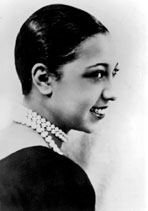
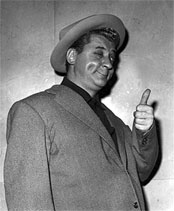
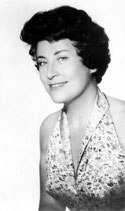
The show called âRecreationâ, by Jacques Chancel with the orchestras of Alex Caturegli and Guy Paquinet, was recorded in the Hotel Majesticâs movie theater with a live audience of a thousand and with millions of Radio France-Asia listeners on its three networks, in French, Chinese, and English.
Jacquel Chancel interviewed visiting celebrities and even Dior models when they stopped over at Tan Son Nhut airport on the way to Tokyo.
The most popular variety show was undoubtedly âParis Saigonâ presented every Friday by RenĂ© Laporte and Jacques Chancel. A lively, youthful show with MichĂšle Stella (Golden Voice), Pierre Duvas (Honey Voice), Jean Pomez (Velvet Voice), Marc Florestan (The Doctor), Pascale Olivier (Charming hostess of Radio-Hirondelle), and Georges Toussaint.
Visiting performers, painters, writers, poets, movie stars, and journalists were interviewed on this show which tried, as its name indicates, to be the link between the capital of France and that of Vietnam.
« Vietnam has regained its in free nation sovereignty. Legally, Radio France-Asia has no more business in the territory. It should therefore get ready to move and leave for Morocco. There, it will be able to continue worthwhile broadcasting.»
«Some ask: and if Morocco manages to gain its independence, then where will Radio France-Asia go? Hey, there is still the Empire of Neptune: the Emperor of the Seas will be happy to open his oceans to this station which will be able to provide entertaining programming to shrimp and fish. »
Thatâs how the Vietnamese newspaper, âAhn Sangâ discussed the French Broadcasting Company in Asia. Radio France-Asia had been allowed to set up and to broadcast programming in Vietnamese territory by virtue of the Franco-Vietnamese agreement signed in 1949. In October of the same year, the French ceded to Vietnam a part of the existing organization in Saigon, Hanoi, HuĂ©, and Dalat. At the time, Radio France-Asia broadcasted programs in French, Vietnamese, English, Cantonese, and Mandarin on two frequencies. The Chinese programs were directed by Jean-Michel de Kermadec, the friendly China expert who was soon about to publish a work about Cholon.
Cholon
by Jean-Michel de Kermadec
The book "Cholon" was written by Jean-Michel de Kermadec with photos from Raymond Cauchetier.
It was printed in december 1955 by "'by the French Overseas Printing Company" (IFOM)
3, Rudyard-Kipling Street in Saigon.

As of March 1955 the station also broadcasts cultural programs in French and Vietnamese.
It would take another Franco-Vietnamese accord to solidify its position. But there, as everywhere, the need for prestigious and effective French politics would be felt. Radio France-Asia must not be silenced. It would only play into the hands of those whose sole purpose, in Asia as elsewhere, is to gag France.

From the book devoted to
Henri Hoppenot
Diplomat and High Commisioner of France in South Vietnam
by Colette Barbier
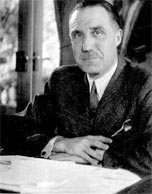
...Ngo Dinh Diem takes on one of the jewels of the Voice of France in the Far-East, the Radio France-Asia station whose closing, requested in December 1955, is scheduled for the end of February 1956.
France ran this station in accordance with the Franco-Vietnamese conventions of 1949. Henceforth, Diem intended to keep the monopoly of radio broadcasts for himself and quite simply canceled the agreements made earlier.
As the flagship of the Voice of France, with its broadcasts in French, English, Vietnamese, Mandarin and Cantonese Chinese, Radio France-Asia covered the whole of the Far-East, part of Oceania, India and even the countries of Northern Europe. It was one of the most powerful stations anywhere in the world. One hundred forty people worked at Radio France-Asia, half of them Vietnamese.
For the French High-Commisioner, Monsieur Hoppenot, the period of humiliation starts all over again. Before the elections, Diem wanted to show that he is independant and the master of Vietnam. There was nothing more poignant and pathetic than the last broadcast of Radio France-Asia, retransmitting the speech of he who embodied French and Western culture, and upon whom fell the task of having to sign all the release documents of France in South Vietnam.
There are a few Gaullist shades of meaning in this text, if only as a reminder of the Brazzaville station, the Voice of Free France. Above all, however, Henri Hoppenot conveys very well the deletion not only of France, but also of Europe and its culture. All members of the High Commission and the personnel of Radio France-Asia who were in the stationâs studios spontaneously sang the "Marseillaise" at the end of the "Goodbye"...
The last moments of Radio France-Asie
Speech on Fev, 27 1956.
displayed by Jean Varnoux to Radio France-Asie Chroniclers.
© INA

Radio Swallow
The broadcasts of "Radio Swallow", "The Voice of French Forces in the Far-East", will cease transmitting on 11 April 1956 at midnight and the silence which took over their frequency definitively marked the effective departure of the Expeditionary Corps.
This is the text of the speech given by General Jacquot, commander in chief, at the occasion of the cessation of transmission of "Radio Swallow":
"Radio Swallow »will cease broadcasting on the evening of 11 April. The different crews who successively staffed the station for the past five years can be proud of a well-accomplished mission. In a few weeks âRadio Swallowâ will be reborn on the soil of Africa and the last contingent of the Expeditionary Corps hearing me tonight will no doubt be among its listeners.
The destiny of the armies of the old military nations is indeed not to know rest. Other delicate missions will be added to those ending in Vietnam. The Government of the Republic recognizes your courage and knows of your experience. I am certain that you will not disappoint the hopes the Nation places in you.
It is in telling you of my confidence in your resolve and my faith in the destinies of the homeland that I wish you good luck, as the station which sustained the morale of the Expeditionary Corps so long and so well goes silent.

The staff of France-Asia
Behind the microphone
- Chroniclers and reporters :
Hoang-Cao-Tang, Jean Vamoux, Jean-Charles LigniĂšres, Gilbert Saron, Jacques Chancel, Jean Piazza (future news anchor at RTF), Jean-Marie BoĂ«dec (who would go on to the office of Radiophonic Cooperation â OCORA and then to ORTF), Jean-Marie Pipon, Jean-Michel de Kermadec, Marina Ceccaldi, Max Clos (future manager of Le Figaro), Philippe Bauchard (later news anchor at Europe 1, TF1, and France-Info), Pascale Olivier, Pierre Ichac, RenĂ© Laporte, RenĂ© Pithon, Rober Grangier, Yves Desjacques..
- Musicians:
Simone Vignes, Maurice Michel, Henri dâHarcourt, and Lucienne Delforge, as well as the orchestras of Pierre Brachet, Jack HĂ©lian, and Alex Caturegli.
- Actors:
George Crozet (since 1940, emcee for theatrical evenings), Jacqueline Fontaine, René Rouen, Lucienne Larmignat, Claude Robin.
- Producers:
Maurice-Alain Richard, Suzanne Robiolle (military programs). .

Messages broadcast
for soldiers in the Far-East
- France-Asia
Jacques and Marina (Jacques Chancel and Marina Ceccaldi)
The program, âThe Soldierâs Recordâ, requests for soldiers stationed in the Far-East, is broadcast daily Monday through Friday for two hours every afternoon.
All record requests can be addressed to:
Military Broadcast for France-Asia Service (Jacques and Marina).
Postal Sector 50.645, T.O.E. (Foreign Operations Theater).
- Radio-Hirondelle (Radio Swallow)
A station was built in Hanoi, with the call sign Radio-Hirondelle (Radio Swallow), which is able to broadcast requested records to soldiers stationed in North-Vietnam (Tonkin).
Requests for this territory can be addressed to:
The Manager, Radio-Hirondelle
Postal Sector 74.682, T.O E.
Excerpt from the "Semaine Radiophonique en Indochine (The Radiophonic Week in Indochina)"

A French plan to replace Radio France-Asia with a 100 kw. shortwave station in Djibouti, "The Voice of France in Asia and Africa" never came to fruition.

